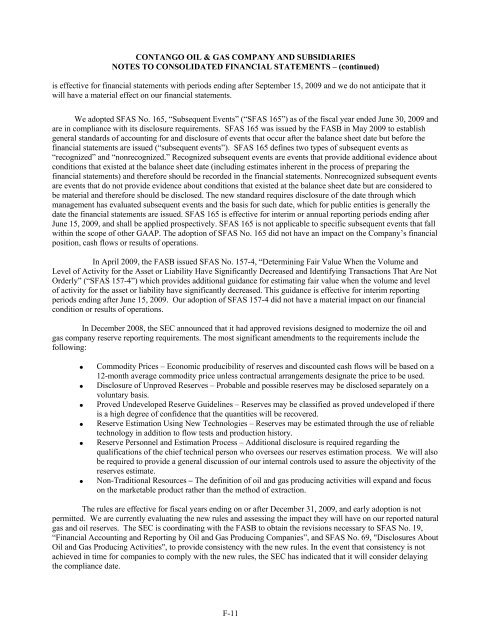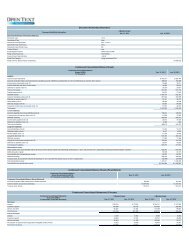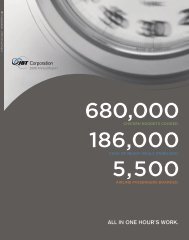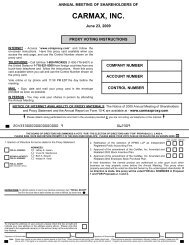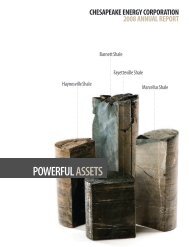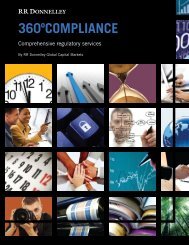FORM 10-K CONTANGO OIL & GAS COMPANY
FORM 10-K CONTANGO OIL & GAS COMPANY
FORM 10-K CONTANGO OIL & GAS COMPANY
You also want an ePaper? Increase the reach of your titles
YUMPU automatically turns print PDFs into web optimized ePapers that Google loves.
<strong>CONTANGO</strong> <strong>OIL</strong> & <strong>GAS</strong> <strong>COMPANY</strong> AND SUBSIDIARIES<br />
NOTES TO CONSOLIDATED FINANCIAL STATEMENTS – (continued)<br />
is effective for financial statements with periods ending after September 15, 2009 and we do not anticipate that it<br />
will have a material effect on our financial statements.<br />
We adopted SFAS No. 165, “Subsequent Events” (“SFAS 165”) as of the fiscal year ended June 30, 2009 and<br />
are in compliance with its disclosure requirements. SFAS 165 was issued by the FASB in May 2009 to establish<br />
general standards of accounting for and disclosure of events that occur after the balance sheet date but before the<br />
financial statements are issued (“subsequent events”). SFAS 165 defines two types of subsequent events as<br />
“recognized” and “nonrecognized.” Recognized subsequent events are events that provide additional evidence about<br />
conditions that existed at the balance sheet date (including estimates inherent in the process of preparing the<br />
financial statements) and therefore should be recorded in the financial statements. Nonrecognized subsequent events<br />
are events that do not provide evidence about conditions that existed at the balance sheet date but are considered to<br />
be material and therefore should be disclosed. The new standard requires disclosure of the date through which<br />
management has evaluated subsequent events and the basis for such date, which for public entities is generally the<br />
date the financial statements are issued. SFAS 165 is effective for interim or annual reporting periods ending after<br />
June 15, 2009, and shall be applied prospectively. SFAS 165 is not applicable to specific subsequent events that fall<br />
within the scope of other GAAP. The adoption of SFAS No. 165 did not have an impact on the Company’s financial<br />
position, cash flows or results of operations.<br />
In April 2009, the FASB issued SFAS No. 157-4, “Determining Fair Value When the Volume and<br />
Level of Activity for the Asset or Liability Have Significantly Decreased and Identifying Transactions That Are Not<br />
Orderly” (“SFAS 157-4”) which provides additional guidance for estimating fair value when the volume and level<br />
of activity for the asset or liability have significantly decreased. This guidance is effective for interim reporting<br />
periods ending after June 15, 2009. Our adoption of SFAS 157-4 did not have a material impact on our financial<br />
condition or results of operations.<br />
In December 2008, the SEC announced that it had approved revisions designed to modernize the oil and<br />
gas company reserve reporting requirements. The most significant amendments to the requirements include the<br />
following:<br />
• Commodity Prices – Economic producibility of reserves and discounted cash flows will be based on a<br />
12-month average commodity price unless contractual arrangements designate the price to be used.<br />
• Disclosure of Unproved Reserves – Probable and possible reserves may be disclosed separately on a<br />
voluntary basis.<br />
• Proved Undeveloped Reserve Guidelines – Reserves may be classified as proved undeveloped if there<br />
is a high degree of confidence that the quantities will be recovered.<br />
• Reserve Estimation Using New Technologies – Reserves may be estimated through the use of reliable<br />
technology in addition to flow tests and production history.<br />
• Reserve Personnel and Estimation Process – Additional disclosure is required regarding the<br />
qualifications of the chief technical person who oversees our reserves estimation process. We will also<br />
be required to provide a general discussion of our internal controls used to assure the objectivity of the<br />
reserves estimate.<br />
• Non-Traditional Resources – The definition of oil and gas producing activities will expand and focus<br />
on the marketable product rather than the method of extraction.<br />
The rules are effective for fiscal years ending on or after December 31, 2009, and early adoption is not<br />
permitted. We are currently evaluating the new rules and assessing the impact they will have on our reported natural<br />
gas and oil reserves. The SEC is coordinating with the FASB to obtain the revisions necessary to SFAS No. 19,<br />
“Financial Accounting and Reporting by Oil and Gas Producing Companies”, and SFAS No. 69, "Disclosures About<br />
Oil and Gas Producing Activities", to provide consistency with the new rules. In the event that consistency is not<br />
achieved in time for companies to comply with the new rules, the SEC has indicated that it will consider delaying<br />
the compliance date.<br />
DB2/2<strong>10</strong>43537.7 F-11


